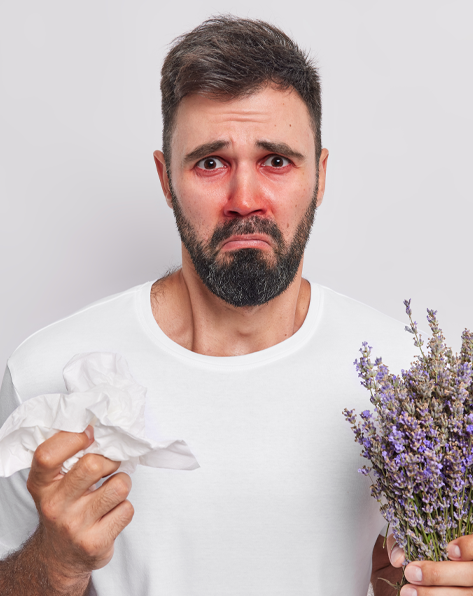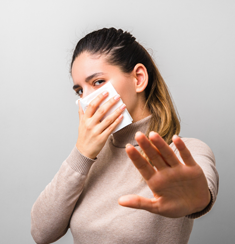

Allergies remain an unanswered question even to the medical community. Medicines also fall short of resolving the issue. The use of steroids may appear to be the solution at the moment however, they come with certain drawbacks. It is therefore crucial to understand the causes of allergies.
Allergy is fast becoming an epidemic in this 21st century. As the west is catching up with the eastern world, the incidence of Bhilwara’s allergies is rising rapidly. As of now, nearly 30 percent of the population is suffering from some form of allergy that includes Allergic rhinitis Allergic sinusitis Allergic conjunctivitis Allergic asthma, skin allergies, food allergy, and allergies to drugs, pets or insect allergy.
One of the primary reasons for this is the acceptance of an urban lifestyle and western diet. Research has shown that those living in farms suffer lesser from allergic reactions than those living in urban environments. The rising levels of environmental pollution and occupational exposures hygiene practices, stress increasing the risk of viral and other infections and a myriad of other factors which are currently being investigated, add to these. A lot of these causes can trigger auto-immune illnesses. There is a connection between auto-immune diseases and allergies and both have a negative impact on the immune system within our bodies. Evara Hospital provides allergy treatment in Bhilwara.
Allergy described as, in the terms of a layman it is a condition in which children are more sensitive to harmless things such as "triggers" like dust or pollen that are not harmful to normal people. Certain children are more susceptible to allergies. The immune system is wired in a different way and interprets that the existence of non-toxic substances is threats and reacts accordingly. So when one child cuddles the cat with ease and another has a bout of sneezing incessantly.
Children who have allergic tendencies are recognized to have a high level of immunoglobin (IgE) antibody levels in blood. They are classified in the category of "atopic" individuals. In reality, the majority of children with allergies react badly to multiple allergens, and not only one. Are you searching best allergy doctor in Bhilwara? Dr. (Prof.) Neeraj Suri is one of the best allergy doctor in Bhilwara.
The symptoms of allergic reactions are caused due to the immune system of your body reacts to an item that is harmful to the majority of people, but causes a reaction in someone who is sensitive to it (similar to the immune system of the body reacting to the body's own tissues in people with auto-immune diseases).
The symptoms of allergies range from respiratory symptoms such as sneezing, cough, runny nose chest tightness, wheezing breathing problems, skin issues such as itchy allergic rash, hives, or an urticaria-like swelling of the skin or angioedema to digestive symptoms such as stomach cramps nausea, bloating, and diarrhoea. Sometimes, chronic arthralgia or migraine may also be signs of an allergic reaction. A severe reaction to an allergic condition referred to as anaphylaxis is potentially life-threatening.
Nowadays, the most common allergies, both globally and in Bhilwara the most common are respiratory allergies such as Allergic rhino-sinusitis. It is a condition that for the majority of patients causes Allergic asthma later in life. It is now a major health risk in Bhilwara. Another area of increasing worry is food allergies and food intolerances, a group of entities that look similar in appearance, yet different in their pathophysiology. They are these are conditions that were previously restricted to western countries and are now becoming prevalent in Bhilwara. Common allergens that we are exposed to include dust mites, pollens and animal dander, mold as well as insect stings, and foods like milk, eggs seafood, fish as well as peanuts, nuts and wheat.
If you are suffering from an allergy, speak with Dr. Neeraj Suri the most effective and best allergy specialist in Bhilwara at Evara Hospital to locate one of the top allergist in Bhilwara. She is experienced in treating allergies. She can conduct an exam and perform the necessary tests. Keep a thorough record of your symptoms and pinpoint the possible triggers before visiting the doctor. If you suffer from an allergy take a detailed record of all the items that trigger allergies you've consumed. Evara Hospital provide best allergy doctor in Bhilwara.
Note any allergies that are present within your family as well as the medications you're currently taking such as the vitamins you are taking and any other supplement. Testing for allergies may be a skin test, where the doctor pokes your skin in order to expose you to small amounts of proteins in suspected allergens, or blood tests to determine the presence of antibodies that cause allergies present in your blood.
Respiratory allergies: This includes allergy rhinoitis (hay fever) and asthmatic allergic that are triggered by airborne allergens such as dust, pollen, and pet dander.
Allergies to Food: reactions to specific food proteins such as peanuts eggs, tree nuts, and shellfish, may cause symptoms that range from anaphylaxis to hives.
Skin Allergies: The conditions like contact dermatitis and eczema arise due to allergic reactions to substances that are in contact with the skin.
Insect Sting Allergies: Certain people may be extremely sensitive to stings from bee’s wasps, or fire ants.
Drug Allergies: Certain medicines cause allergic reactions, which can range from mild rashes up and even life-threatening allergic anaphylaxis.
Tests for Skin Pricks (SPT): This is the most commonly used allergy test. It involves putting a tiny amount of allergens that are suspected to cause allergic reactions onto the surface of your skin most often on the forearm. Then poking the skin until the substance is absorbed underneath its skin's layer. The test is designed to detect immediate allergic reactions that typically manifest as a bump raised that is surrounded by redness.
Intradermal skin testing similar to SPT, but it involves injection of a tiny amount an allergen in the skin. The test is commonly used to detect allergic reactions to environmental allergens medicines (like penicillin) as well as insect stings.
patch testing is used to determine allergens that cause contact dermatitis, patches testing involves placing patches containing various allergens on the skin, primarily placed on backs, then monitoring the reaction after 48 hours, and then after 72 hours or 96hrs.
Testing for Blood (Specific IgE Testing) the tests determine the amount of I.e. antibodies against specific allergens present in blood. They are employed in cases where skin tests are not practical, for instance those with severe skin problems or taking medicines that may hinder skin testing.
Pulmonary Function Tests (PFTs): They are used to evaluate the lung function, especially for asthma patients that is often related to allergies.
Oral food challenges the gold standard to diagnose food allergies. This test involves taking in increasing quantities of the allergenic food under the supervision of a medical professional to check the reaction of allergic reactions.
Nasal Provocation Test It involves applying the allergen of concern directly to the nasal mucosa, and looking for an allergic reaction. Helpful for diagnosing allergic rhinitis.
Drug Allergy Testing Tests for skin and, in certain cases oral challenges that can help identify reactions to specific medications.
Allergen Immunotherapy (Allergy shots): A long-term treatment that reduces symptoms in people who suffer from allergic rhinitis, conjunctivitis, asthma, or insects that sting allergy. It involves administering higher doses of allergen in order to increase tolerance.
Spirometry is often used by asthma patients, spirometry is a method of measuring the quantity and velocity of air exhaled and breathed in it helps diagnose and track respiratory ailments.
Educational Counseling providing patients and their families with tips on dealing with allergies and avoiding triggers and using medication correctly.
Atopy Patch Testing for diagnosing delayed type hypersensitivity reactions, especially when they are associated with Atopic dermatitis as well as certain food allergies.
Skin Allergies
An allergy to the skin is the body's response to an external stimulus to your skin, which your immune system interprets as an attack. The allergic reaction is typically caused by antibodies that are sent to the affected area to ward off the threat or allergen. This results in an itchy rash. the condition is referred to by the name of "contact dermatitis."
These are the most frequent Skin Allergy causes.
Allergies can affect the lungs, sinuses, nasal passages, skin and digestion system, depending on what chemical. Allergies could trigger a fatal reaction, known as anaphylaxis in severe conditions.
The following are two of the most frequently utilized tests to determine the source for an allergy skin condition.
T.R.U.E. Test: In this exam your physician will apply various sheets on the back of your body which contain diverse allergies.
R.O.A.T. test: Apply the allergen you suspect to your face for couple of days, much like the patch test.
Allergen Prevention: This is usually the most important aspect in stopping allergic reactions and decreasing symptoms.
Medicines Based on the allergy you have, medicines may help to decrease your immune system response and reduce symptoms.
Immunotherapy This treatment involves injections of allergen extracts purified given over the course of a few years.
The Allergy Department in an environment of healthcare has several major advantages:
Specialistized Expertise in Diagnostics Allergists are trained to recognize an array of allergic conditions, ranging from the most common allergic reactions to more intricate immunological disorders.
Full Allergy Testing The department offers numerous options for testing, including skin test pricks as well as intradermal tests, patches tests, and blood tests to determine specific IgE antibodies, which can be used to detect allergens.
Immunotherapy The one treatment that can alter the course of natural allergic disorders. Allergists can administer and track the effects of immunotherapy to ensure long-term relief.
education and prevention Allergy services provide information on allergen avoidance, diet treatment for food allergies and early detection of allergies.
Better quality of life by reducing symptoms of allergies and addressing comorbid allergies, allergists can improve the overall quality of life.
Lang-term care and follow-up Chronic allergies require continuous care and allergy departments have the resources to offer this continuous care and adjust the treatment plan as patients get older or their health conditions change.
Emergency preparedness the goal is to train patients on how to handle acute allergic reactions by using auto-injectors for epinephrine, and to recognize the need to seek emergency medical attention.
A consultation for allergies with Evara Hospital consists of the patient filling out an allergy questionnaire. This is followed by an extensive inquiry into his past and a general exam by a doctor. If necessary, she is then referred to tests, which could include tests for blood, lung function test, radiology or tests for skin pricks. As a certified allergy specialist, Dr. Neeraj Suri herself administers the tests using skin pricks. The patient is then advised of further treatment that includes counseling, pharmacotherapy (diet as well as lifestyle) and, if appropriate the use of allergen-specific treatment (allergy vaccines) or biologicals. If the patient desires or calls for it, a nutritional consultation can be arranged.
Types of Skin Allergies:
They are available in various types. These are some of the more popular varieties:
Contact Dermatitis: If, for example, you've experienced a rash following wearing a new ring, or using an alternative soap, it's likely that you've experienced this condition.
The skin is exposed to an allergen, such as nickel, or a chemical that is present in soap, lotion or sunblock.
Airborne particles like pollen can cause dermatitis if they touch the skin. Your doctor might refer to this as "airborne contact dermatitis."
In certain instances there are instances where you'll experience reactions only after having been exposed to sunlight. It's sometimes referred to as "photoallergic contact dermatitis." It's caused by chemical compounds, such as those found in sunscreens or shaving lotions, as well as perfumes.
The symptoms vary from mild to serious. The symptoms can be characterized as:
It is rare to get an immediate reaction. It could take anything between a few hours and 10 days. It typically takes between 12 hours to three days.
Even after treatment, the symptoms can last from 2 to 4 weeks.
Hives They are itchy, red bumps or welts. Contact dermatitis is a common cause of it, but allergies to bites from insects, medication or food items can cause reactions. Hives typically develop immediately and fade after several hours or even days.
Eczema It is possible to hear this as "atopic dermatitis." It's an ongoing allergic condition that generally develops in the early years of the early years of childhood. Around 11 percent of Americans suffer from it. Experts don't know what triggers to it. However, they do know that certain triggers could cause your skin to become itchy dry, red, and itchy. These triggers include:
The signs that are a result of an allergic reaction generally appear within a matter of minutes after exposure to an allergen but they could appear gradually over the course of a few hours.
The most common reactions to an allergic reaction are:
The symptoms can vary based the substance you're allergic to and how you come in contacts with the substance. For example, you might suffer from a runny nose when you're exposed to pollen. You may also or develop an itch if you suffer from allergies to your skin or experience nausea if you eat food that which you're sensitive to.
The most frequently reported allergies that cause illness include hayfever (allergic rhinitis) asthma as well as the eczema (allergic dermatitis) and contact dermatitis. Food allergy, and the urticaria (hives).
Allergic reactions can have various names based on the area of your body your reaction is taking place. If an allergic reaction happens in your eyes, nose and sinuses, doctor will identify it as allergic rhinitis. If the reaction is happening in your lungs, we will call it asthma. All of these allergies are caused by inflammation. In other words, there is an inflammation that is typical of the immune system that causes allergies within those areas of your body. This is why we identify the ailment with the above-mentioned scientific names.
Allergies can be a problem for anyone, regardless of gender, age or race. While it's true that allergic reactions tend to be more prevalent among children, they can be present on their own at any point in time and in some instances it is a recurrence after a long period of complete remission.
Although the exact causes aren't yet fully understood however, the susceptibility to allergic reactions and allergy-related diseases, is attributed to the genetic code.
It will take at minimum 10 days before you become allergic to something upon first encounter with it. It is possible to contact something for a long time before you develop an allergic reaction.
However, once you've developed the allergy you might be afflicted within minutes of getting in close contact. Sometimes, it takes up to a few days.
The most frequent sources of allergic skin are:
It is more likely that you will suffer from particular skin allergies if have a skin problem such as eczema (your doctor might refer it to as Atopic Dermatitis) and inflammation in your lower legs as a result of the lack of circulation, itching on your private areas or you frequently get swimmer's ears.
With a strong foundation of integrity and sincerity, we adopt a transparent, inclusive
and flexible approach, even as we nourish our spirit of continuous learning that enables us to enrich and enhance our service delivery to careseekers.
To adhere to courtesy, compassion and commitment and integrate cutting-edge ENT medical care for the greater good of humanity.
To contribute to build a healthier community, nation and world by facilitating premier ENT healthcare that is accessible to all.
Always prepared to go the extra mile, and offer nothing less than the best to each of our patients; we strive to reach excellence by surpassing patrons expectations while adding value to each of our services

Choosing us means partnering with experienced coaches who are dedicated to unlocking your potential.
Maximizing growth through strategic profit enhancement.
Over a decade of proven industry expertise for your business.
Delivering tailored solutions to meet your business needs.
Leading the way with unmatched industry expertise.
We understand that no two clients are the same. That’s why we create personalized coaching plans designed to address your specific challenges and goals. Whether you’re focusing on personal growth or business development, our tailored approach ensures you get the exact guidance you need to succeed.


Copyright © 2025. All Rights Reserved.
Social Chat is free, download and try it now here!
Our backyard has been completely transformed! The team was professional, attentive, and delivered beyond our expectations. the quality of work is outstanding.
Annette Black Sr. Gardener